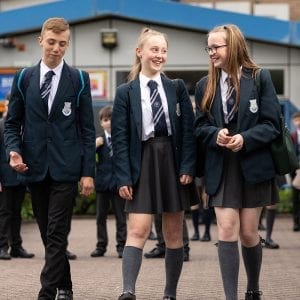Music
Vision
At Birchwood, we want our students to be able to articulate their ideas about a wide variety of music from a range of genres. We want our students to feel a sense of confidence in taking part and performing within music. We also want our students to feel empowered in their knowledge of the theory of music to compose with creativity and assurance.
How do we build on what students learn at KS2?
We want to ensure that our students are thoroughly supported in their transition from KS2 to KS3 music. In order to do this, we work with local primary schools so that our curriculums complement one another. In year 7, we purposely prioritise revisiting and rebuilding on the following:
- Revisit singing
- Listening with attention to detail
- Continue to develop their understanding of the history of music
- Use and understand graphic and stave notation
- Improvise and compose music
- Appreciate music from different traditions, time and composers
How do we cover the KS3 National Curriculum and beyond?
We believe that covering the KS3 National Curriculum is hugely important but we also recognise how crucial it is for students to be exposed to wider knowledge beyond this.
Pupils build on their previous knowledge and skills through performing, composing and listening. They develop their vocal and/or instrumental fluency, accuracy and expressiveness, and understand musical structures, styles, genres and traditions, identifying the expressive use of musical dimensions. They learn to listen with increasing discrimination and awareness to inform their practice as musicians. They use technologies appropriately and appreciate and understand a wide range of musical contexts and styles.
Pupils are taught to:
- Play and perform confidently in a range of solo and ensemble contexts using their voice, playing instruments musically, fluently and with accuracy and expression
- Improvise and compose; and extend and develop musical ideas by drawing on a range of musical structures, styles, genres and traditions
- Use staff and other relevant notations appropriately and accurately in a range of musical styles, genres and traditions
- Identify and use the interrelated dimensions of music expressively and with increasing sophistication, including use of tonalities, different types of scales and other musical devices
- Listen with increasing discrimination to a wide range of music from great composers and musicians
- Develop a deepening understanding of the music that they perform and to which they listen, and its history
We ensure that we cover the KS3 National Curriculum by covering the following (KS3 headings/ key points):
- Year 7: An introduction to Music – Elements of Music, Instruments and Families, Treble Clef pitch, Latin American Music
- Year 8: How Music has changed over time – Musical Eras – Early to 21st Century, The Blues, Reggae including band performances
- Year 9: – Film Music, Pop Music Performance
Beyond the curriculum, we provide:
- Annual School production
- DCP Faculty London Trip
- The Rockstar Project
- Flute choir
- Singing club
- Pop choir
- Keyboard club
- Drumming club
What do we cover in KS4 and how do we aspire towards KS5?
We ensure that our curriculum revisits key ideas that are covered in key stage 3 and provide a foundation for study at key stage 4.
Year 10: performing – solo and ensemble practice, composing skills with the free composition in Term 3, listening and appraising skills including introduction to Toto set work.
Year 11: performing final solo and ensemble, composing the set-brief composition in Term 1, Listening and appraising skills including introduction to Bach set work and consolidation of knowledge.
We want to ensure that our students are ready for life beyond KS4. In order to do this we expose our students to a range of ambitious content and ideas:
- Explicit links to studying music at KS5
- Encouraging a lifelong love of music
KS3 Curriculum Overview
| Why Then? Why Now? | |||
| Aim: Throughout the three years they will build their knowledge of a variety of genres, music theory, notation, music technology and practical experiences in preparation for the four areas of study, composing and performing at GCSE level. | |||
| Objectives: To give a broad experience of the basics of music. | |||
|
Year 7 Overview Many pupils have not studied Music KS1& KS2 so need to develop basic skills. We do this by teaching them: · The Elements of Music · Reading, writing and understanding basic notation. · Reading and playing treble clef pitches · Basic keyboard skills · Extension of rhythm through Latin music
|
|||
| 18 lessons on rotation | Project 1 | Project 2 | Project 3 |
|
Learning Question
Overview of Key knowledge |
What can I hear?
The Elements Rhythm & Sonority
|
What can I hear?
Pitch, Keyboards & Chords Hand placement Reading music Adding accompaniment to a melody Rhythm & Sonority The Elements
|
What can I hear?
Latin music Genres Sub-genres Syncopation Musical style Rhythm & Sonority The Elements Reading music
|
| Why |
This is the first essential information which should be taught in order to understand how the building blocks of Music are used. Consolidation of elements knowledge and application. Introduction to rhythmic notation and instrumental timbres. |
Introducing pitch notation to consolidation of rhythm. Solo keyboard performing, correct hand positions, RH melody, adding LH primary chords.
|
Adding syncopation and more complicated rhythms to repertoire. Performance through percussion instruments, ensemble skills. Introducing music from other cultures. |
| Building and revisiting |
Building on the knowledge of the elements of music.
|
Learning music through musical practice. Building on knowledge of The Elements.
|
Building on knowledge of The Elements. Learning about the history of Latin music. Learning Spanish music by playing different instruments. Learning through musical practice.
|
| Assessment |
RAP Knowledge Test – Elements of Music, Instruments of the Orchestra |
RAP Perform – keyboard skills, RH then adding LH accompaniment Knowledge Test – Notation |
RAP Perform – percussion rhythms, keyboard melody with chords Knowledge Test – recognising the features and instruments of Latin Music |
|
Year 8 Overview Developing knowledge from prior learning and learning more. We do this by teaching them: · Music History from Early to 21st Century · The Blues and its influence on history · Reggae and the extension of knowledge of rhythm · Development of performance skills on keyboard and other instruments
|
|||
| 18 lessons on rotation | Project 1 | Project 2 | Project 3 |
|
Learning Question
Overview of Key knowledge |
How has Music changed over time?
Musical Eras – Early to 21st Century Genre Composers Development of instruments Rhythm & Sonority The Elements Reading music
|
How has Music changed over time?
The Blues – Chord patterns Composers Improvisation Walking bassline Bass riff Rhythm & Sonority The Elements Reading music
|
How has Music changed over time?
Reggae Syncopation Skank bubble Composers Musical style Rhythm & Sonority The Elements Reading music
|
| Why | It is important to be able to place music in context and have a working knowledge of the development of instruments and the orchestra through time. Keyboard performance skills developed. |
How Blues shaped and influenced musical history. Solo keyboard performing skills through 12 bar blues chords in LH and melody in RH, developing to adding bass riff and improvising own ideas using the blues scale.
|
Developing keyboard and vocal performing skills. Offbeat rhythms and syncopation continued from Latin Music. |
| Building and revisiting |
Reviewing and building upon knowledge of the Elements of Music inc Pitch, Rhythms, Keyboard notation. Revising the history of Latin music and Spanish music by playing different instruments. Learning through musical practice.
|
Reviewing knowledge of the Elements of Music and notation, learning the Eras of Music and associated composers and features. | Reviewing knowledge of the Elements of Music, notation, Latin Music, Eras of Music and 12 Bar Blues. |
| Assessment |
RAP Perform – Classical piece “Fur Elise” Knowledge Test – main features of classical music eras and instruments |
RAP Devise – own melody using the Blues improvising scale and add to sequenced Blues components Perform and record each component of Blues composition Knowledge Test – 12 bar blues history and musical layers |
RAP Devise – group performance of Three Little Birds using the instruments – guitar, drums, keyboard, voice Perform Three Little Birds to class
|
|
Year 9 Overview Pushing the limits / Inspire!! We do this by teaching them: · How melodic riffs are vital in film. · Developing pre-existing motifs using Music Tech · How Rock n Roll shaped Pop Music and developments throughout the decades · What makes a good song?
|
|||
| 18 lessons on rotation | Project 1 (8 lessons) | Project 2 (10 lessons) | |
|
Learning Question
Overview of Key knowledge |
How do you respond to a brief?
Film music. Rhythm & Sonority The Elements Hand placement Adding accompaniment to a melody Reading music Syncopation Composers
|
What makes a good song?
Song writing / Composing. Rhythm & Sonority The Elements Reading music Composers Bass riff Syncopation
|
|
| Why | Investigating the use of motif (hooks and riffs) in film music, the development of film music over the last 150 years and the functions of music in film. Improving keyboard skills, learning film motifs. Developing music Tech skills, responding to the composition brief | Investigating music from different decades from 1950s Rock n Roll onwards. Performing in ensembles and solo work. | |
| Building and revisiting |
Revisiting the elements of music, notation, Latin Music, Eras of Music and 12 Bar Blues. Building their knowledge on film music and composers. |
Revisiting the elements of music. Building their knowledge on how the different elements and motifs contribute to developing themes and then writing a song. |
|
| Assessment |
RAP Perform – Hedwig’s Theme on keyboard Knowledge Test – compose an arrangement of the theme using Bandlab |
RAP Devise own song with lyrics, melody and layers of accompaniment Knowledge Test – features of each decade of pop, be able to recognise the music of each era |
|





